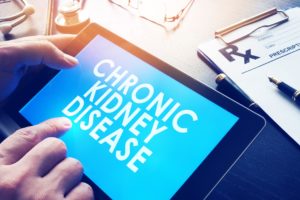 Approximately 30 million adults in the United States are living with chronic kidney disease (CKD). This condition causes damages to kidneys and leads to a loss of function over time. If your kidneys are unable to function properly, complications such as hypertension, nerve damage, weakened bones and anemia can develop. CKD also increases the risk of developing cardiovascular disease.
Approximately 30 million adults in the United States are living with chronic kidney disease (CKD). This condition causes damages to kidneys and leads to a loss of function over time. If your kidneys are unable to function properly, complications such as hypertension, nerve damage, weakened bones and anemia can develop. CKD also increases the risk of developing cardiovascular disease.
While high blood pressure can result from chronic kidney disease, it can also be the cause of it. Other conditions and diseases that can cause CKD include diabetes, recurrent kidney infections, prolonged obstruction of the urinary tract and vesicoureteral reflux.
Anyone at any age can develop chronic kidney disease; however, some people are more at risk than others. You may have an increased risk for CKD if you:
- Have a family history of kidney failure
- Have diabetes
- Have hypertension
- Are obese
- Have cardiovascular disease
- Are a smoker
- Are of African American, Native American, Pacific Islander or Asian American descent
- Are an older adult
Signs and symptoms of chronic kidney disease can vary by individual and may appear over time as the disease progresses. They can include:
- Muscle cramps and twitches
- Swelling of feet and ankles
- Trouble concentrating
- Fatigue
- Frequent urination, especially at night
- Itchy skin
- Shortness of breath
- Difficulty sleeping
- High blood pressure
- Vomiting
There are several things you can do to prevent CKD and keep your kidneys healthy. Maintaining a healthy diet and cutting back on food rich in sugar and salt is beneficial for your kidneys, as well as monitoring cholesterol levels, keeping hydrated, quitting smoking and drinking in moderation.
If you are living with chronic kidney disease, it is strongly advised that you keep blood pressure and blood sugar levels under control, moderate protein consumption, reduce salt intake, avoid NSAIDs (nonsteroidal anti-inflammatory drugs) and get the flu shot each year.
All content of this newsletter is intended for general information purposes only and is not intended or implied to be a substitute for professional medical advice, diagnosis or treatment. Please consult a medical professional before adopting any of the suggestions on this page. You must never disregard professional medical advice or delay seeking medical treatment based upon any content of this newsletter. PROMPTLY CONSULT YOUR PHYSICIAN OR CALL 911 IF YOU BELIEVE YOU HAVE A MEDICAL EMERGENCY.
